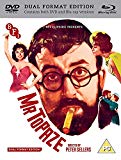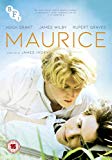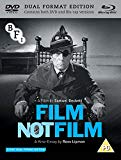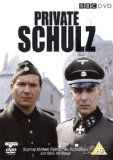![The Krays [1989]](/pictures/1035168.jpg) The Krays | DVD | (02/02/2009)
from £9.50
| Saving you £8.25 (106.59%)
| RRP
The Krays | DVD | (02/02/2009)
from £9.50
| Saving you £8.25 (106.59%)
| RRP Bonded by blood. Prepare to be shocked by the story of Britain's most notorious gangleaders - the Kray twins. Gary and Martin Kemp star in this brutally stark account of the absolute rulers of London's East End underworld through their reign of terror in the 1950's and 1960's. Their power was born from fear their respect demanded by brutality so horrific that eventually even their own turned against them. Chinks begin to appear in the seemingly impregnable armour of 'The Kra
 Maurice (2-disc Blu-ray) | Blu Ray | (04/03/2019)
from £21.63
| Saving you £N/A (N/A%)
| RRP
Maurice (2-disc Blu-ray) | Blu Ray | (04/03/2019)
from £21.63
| Saving you £N/A (N/A%)
| RRP The repressed and bourgeois Maurice Hall (James Wilby) tackles the prejudices of Edwardian society as he comes to terms with his sexuality, in this landmark drama from the team behind A Room with a View (1985) and Howard's End (1992). From the halls of Cambridge University to the cricket fields of the English gentry, this profound tale of emotional and sexual awakening features star-making performances from Wilby, Hugh Grant and Rupert Graves, and perfectly captures the fears and joys of submitting to a forbidden desire. Described by The Guardian as undervalued and underseen and a pre-cursor to the James Ivory-scripted Call Me By Your Name (2017), Maurice is a landmark film as important as any in the history of gay cinema and one that presents a positive and enriching portrait of first love. Special Features: Interview with James Ivory and Pierre Lhomme on the making of Maurice (16 mins) On-stage Q&A with James Ivory and Pierre Lhomme, moderated by Nicholas Elliott (23 mins) A Director's Perspective (40 mins): a conversation between James Ivory and Tom McCarthy, the director of Spotlight Short interview with stars Hugh Grant and James Wilby (2017, 5 mins) Deleted scenes (39 mins) Original theatrical trailer 2018 re-release trailer Other extras TBC Fully illustrated booklet featuring an interview with James Wilby, new writing on the film, and full film credits
![Shooting The Past [1999]](/pictures/1018494.jpg) Shooting The Past | DVD | (09/02/2004)
from £9.73
| Saving you £6.26 (64.34%)
| RRP
Shooting The Past | DVD | (09/02/2004)
from £9.73
| Saving you £6.26 (64.34%)
| RRP A country house situated in the London suburbs holds a collection of photography dating back through the last century. Plans have been raised to divide the collection and turn the house into a business school.... Three-part drama written and directed by Stephen Poliakoff about the battle to save a vast photographic library. A US property developer finds the library employees still ensconced in a London building he's come to renovate. After unsuccessfully trying to sell the pictures to an advertising agency Marilyn makes a personal plea to Anderson. Meanwhile Oswald begins an investigation into Anderson after seeing a picture of his mother in the library.
![The Krays [Blu-ray]](/pictures/1164265.jpg) The Krays | Blu Ray | (20/11/2023)
from £16.99
| Saving you £N/A (N/A%)
| RRP
The Krays | Blu Ray | (20/11/2023)
from £16.99
| Saving you £N/A (N/A%)
| RRP From their humble East End beginnings, Ronnie and Reggie Kray became the most notorious figures in London's gangland underworld. From extortion to murder, their horrific brutality became legendary and throughout the 50s and 60s they ruled by fear, until life sentences in 1969 finally ended their bloody reign of terror. Product Features East End Medak: a new interview with Director Peter Medak Burdis Meets The Krays: a new interview with Producer Ray Burdis New audio interview with writer Philip Ridley New audio commentary by film historian Scott Harrison Archive audio commentary by Peter Medak, Gary Kemp and Martin Kemp BFI 2015 Q&A with Gary Kemp, Martin Kemp, Kate Hardie, Peter Medak and Philip Ridley
![The Krays [1989]](/pictures/1004781.jpg) The Krays | DVD | (20/09/1999)
from £8.43
| Saving you £1.56 (18.51%)
| RRP
The Krays | DVD | (20/09/1999)
from £8.43
| Saving you £1.56 (18.51%)
| RRP ![The Omen Trilogy [1976]](/pictures/1023020.jpg) The Omen Trilogy | DVD | (20/06/2006)
from £15.85
| Saving you £24.14 (152.30%)
| RRP
The Omen Trilogy | DVD | (20/06/2006)
from £15.85
| Saving you £24.14 (152.30%)
| RRP In 1976 The Omen scored a hit with critics and audiences hungry for more after The Exorcist with its mixture of Gothic horror and mystery and its plot about a young boy suspected of being the personification of the anti-Christ. Directed by Richard Donner (best known for his Superman and Lethal Weapon films), The Omen gained a lot of credibility from the casting of Gregory Peck and Lee Remick as a distinguished American couple living in England, whose young son Damien bears "the mark of the beast". At a time when graphic gore had yet to dominate the horror genre, this film used its violence discreetly and to great effect and the mood of dread and potential death is masterfully maintained. It's all a bit contrived, with a lot of biblical portent and sensational fury but few would deny it's highly entertaining. Jerry Goldsmith's Oscar-winning score works wonders to enhance the movie's creepy atmosphere. --Jeff Shannon, Amazon.com Damien: Omen II takes place several years after the mysterious events that claimed the life of the US Ambassador and his wife as the now teenaged and militarily enrolled Damien Thorne is slowly being made aware of his unholy heritage and horrific destiny. Woe is he (including anyone in Damien's adoptive family and his classmates) who suspects the truth or gets in his way. While not as unrelentingly frightening as its blockbuster predecessor, this more-than-competent sequel raises some interesting questions about the nature of free will (can the anti-Christ deny his birthright?) before falling into a gory series of increasingly outlandish deaths, the best of which is a terrifyingly protracted scene beneath the ice of a frozen lake. Jerry Goldsmith (who won an Oscar for his work on the first film in the series) contributes another marvellously foreboding score. --Andrew Wright, Amazon.com The series concludes with The Omen III: The Final Conflict, starring Sam Neill as the adult Damien--aka the son of Satan--in a battle with the heavens for control of mankind. The film ends up depending more heavily on effects and spectacle than on the kind of basic horrors that made the first movie in the series so unsettling but at least this one gives some closure to the seemingly endless saga. --Tom Keogh, Amazon.com On the DVDs: On the original movie disc there is an all-new 45-minute documentary, "666: The Omen Revealed", with contributions from all the major behind-the-scenes players, including director, editor, screenwriter (who confesses the movie was only set in England because he wanted a free trip to London!), producer and composer. The latter, Jerry Goldsmith, has his Oscar-winning contribution to the movie recognised with a separate feature in which he talks through four key musical scenes in the score. There's also a thought-provoking short called "Curse or Coincidence?" in which the many bizarre accidents that happened during shooting are related, including the terrible story of what happened to the girlfriend of the man responsible for designing the decapitation scene. Director Richard Donner and editor Stuart Baird provide a chatty audio commentary to the movie. The second and third films lack as many extra features, being content with audio commentaries and theatrical trailers: the commentary for Omen II is by producer Harvey Bernhard, that for Omen III by director Graham Baker. --Mark Walker
![The Omen [1976]](/pictures/1023019.jpg) The Omen | DVD | (20/06/2006)
from £6.52
| Saving you £6.47 (99.23%)
| RRP
The Omen | DVD | (20/06/2006)
from £6.52
| Saving you £6.47 (99.23%)
| RRP In 1976 The Omen was a hit among critics and audiences hungry for more after The Exorcist with its mixture of Gothic horror and mystery and its plot about a young boy suspected of being the personification of the Antichrist. Directed by Richard Donner (best known later for his Superman and Lethal Weapon films), The Omen gained a lot of credibility from the casting of Gregory Peck and Lee Remick as a distinguished American couple living in England, whose young son Damien bears "the mark of the beast". At a time when graphic gore had yet to dominate the horror genre, this film used its violence discreetly and to great effect, and the mood of dread and potential death is masterfully maintained. It's all a bit contrived, with a lot of biblical portent and sensational fury, but few would deny it's highly entertaining. Jerry Goldsmith's Oscar-winning score works wonders to enhance the movie's creepy atmosphere. --Jeff Shannon, Amazon.com On the DVD: The all-new 45-minute documentary, "666: The Omen Revealed", has contributions from all the major behind-the-scenes players, including director, editor, screenwriter (who confesses the movie was only set in England because he wanted a free trip to London), producer and composer. The latter, Jerry Goldsmith, has his Oscar-winning contribution to the movie recognised with a separate feature in which he talks through four key musical scenes in the score. There's also a thought-provoking short called "Curse or Coincidence?" in which the many bizarre accidents that happened during shooting are related, including the terrible story of what happened to the girlfriend of the man responsible for designing the decapitation scene--spooky. Director Richard Donner and editor Stuart Baird provide a chatty audio commentary to the film, and the DVD package is completed by the original theatrical trailer. --Mark Walker
 Mr Topaze (DVD + Blu-ray) | Blu Ray | (15/04/2019)
from £18.98
| Saving you £N/A (N/A%)
| RRP
Mr Topaze (DVD + Blu-ray) | Blu Ray | (15/04/2019)
from £18.98
| Saving you £N/A (N/A%)
| RRP Chosen by the British public to be digitised by the BFI in 2016, Peter Sellers directs and stars in this bittersweet character comedy based on a Marcel Pagnol short story. Described by Sellers biographer, Roger Lewis, as a lost classic, Mr Topaze marked the actor's official directorial debut, and teams him with his Ladykillers (1955) and Pink Panther series co-star Herbert Lom in a cast that also features Billie Whitelaw, Leo McKern, John le Mesurier and Joan Sims. Playing the eponymous Mr Topaze, a poor, provincial French schoolteacher slowly corrupted by big business, Sellers' is at the peak of his powers. Unseen for decades, this lost British comedy classic is available for the first time on Blu-ray and DVD and is essential viewing for fans of Sellers unique brand of humour. Special Features: Original Other extras TBC Fully illustrated booklet with new writing on the film and full film credits
 Maurice (2-disc DVD) | DVD | (04/03/2019)
from £18.48
| Saving you £N/A (N/A%)
| RRP
Maurice (2-disc DVD) | DVD | (04/03/2019)
from £18.48
| Saving you £N/A (N/A%)
| RRP Nearly 20 years after his death, Toshiro Mifune remains a true giant of Japanese cinema. Rich with archive footage and personal reminiscences from family and friends, this Keanu Reeves- narrated documentary shines a light on both the man and the actor, starting with his childhood and military service, through to his early years in the popular 'chanbara' action movies that he would later draw on for a string of masterpieces made with legendary filmmaker Akira Kurosawa. Featuring contributions from Steven Spielberg and Martin Scorsese, Mifune: The Last Samurai reveals him as a formidable and mercurial talent, both onscreen and off, and an influence that still resonates through world cinema. Special Features: Original trailer Other extras TBC Fully illustrated booklet
![The Omen Trilogy - The Omen/Damien - Omen 2/Omen 3 - The Final Conflict [Blu-ray] [1976]](/pictures/1088631.jpg) The Omen Trilogy - The Omen/Damien - Omen 2/Omen 3 - The Final Conflict | Blu Ray | (20/10/2008)
from £17.38
| Saving you £-0.63 (N/A%)
| RRP
The Omen Trilogy - The Omen/Damien - Omen 2/Omen 3 - The Final Conflict | Blu Ray | (20/10/2008)
from £17.38
| Saving you £-0.63 (N/A%)
| RRP Set Comprises: The Omen (1976): He was born at 6am on the 6th day of the 6th month. The coming of Armageddon the sign of the final confrontation between the forces of good and evil as foretold in the Book of Revelations will begin with the birth of the son of Satan - in human form. The Omen II (1978): After the tragedy that befell his parents Robert and Katherine Thorn Damien is taken in by his caring Aunt and Uncle. However Damien is growing and so too are his mysterious powers - it is time for Damien to find out what his destiny really is... The Omen III (1981): Armageddon has come and the Evil One stands among us. His name is Damien Thorn and the power of evil is no longer in the hands of a child. The final and most terrifying chapter in the Omen Trilogy sees the fate of all mankind hanging in the balance as the battle lines are drawn for the ultimate war between good and evil for the Final Conflict.
![Payroll [1961]](/pictures/1075006.jpg) Payroll | DVD | (11/02/2008)
from £N/A
| Saving you £N/A (N/A%)
| RRP
Payroll | DVD | (11/02/2008)
from £N/A
| Saving you £N/A (N/A%)
| RRP A vicious gang of crooks plan to steal the wages of a local factory but their carefully laid plans go wrong...
![Wessex Tales [DVD]](/pictures/1093914.jpg) Wessex Tales | DVD | (12/04/2010)
from £N/A
| Saving you £N/A (N/A%)
| RRP
Wessex Tales | DVD | (12/04/2010)
from £N/A
| Saving you £N/A (N/A%)
| RRP Wessex Tales
![Dinner Of Herbs [2000]](/pictures/1019316.jpg) Dinner Of Herbs | DVD | (14/04/2003)
from £5.67
| Saving you £4.32 (76.19%)
| RRP
Dinner Of Herbs | DVD | (14/04/2003)
from £5.67
| Saving you £4.32 (76.19%)
| RRP Based on Catherine Cookson's best-selling novel of murder passion and betrayed friendships this sweeping drama spans forty years during the second half of the 19th century. Roddy Greenback arrives in a remote Northumberland community. His father meets a violent death leaving the boy alone with no family to speak of. The young Roddy is adopted and raised by Kate Makepeace a good friend of his father and develops a close friendship with Hal and Mary Ellen but their sibling bond is put to the test as they become adults. The hidden secrets of the past are painfully unearthed as their lives continue to be intertwined by a tragic destiny.
![Gumshoe (Standard Edition) [Blu-ray] [2022] [Region Free]](/pictures/1159186.jpg) Gumshoe (Standard Edition) | Blu Ray | (27/06/2022)
from £9.99
| Saving you £N/A (N/A%)
| RRP
Gumshoe (Standard Edition) | Blu Ray | (27/06/2022)
from £9.99
| Saving you £N/A (N/A%)
| RRP This brilliant feature debut from director Stephen Frears (My Beautiful Laundrette, Dangerous Liaisons, The Grifters) is an affectionate and uniquely British tribute to the Hollywood detective movies of the 1940s. Starring the great Albert Finney (Saturday Night and Sunday Morning, Murder on the Orient Express, Skyfall) as a Liverpool bingo caller who dreams of being a private eye and then finds himself suddenly contacted for what appears to be an actual piece of detective work. Product Features High Definition remaster Original mono audio Stephen Frears on 'Gumshoe' (2018, 18 mins): the acclaimed director discusses the film's production history Neville Smith on 'Gumshoe' (2018, 16 mins): the celebrated writer and actor discusses his work on the film, for which he won a Writers' Guild of Great Britain Award Producer Michael Medwin on 'Gumshoe' (2018, 2 mins): a short interview with the actor and producer Editor Charles Rees on 'Gumshoe' (2018, 25 mins): an insightful interview with the film's original editor Production Designer Michael Seymour on 'Gumshoe' (2018, 3 mins): a brief recollection of the film's production Actor Tom Kempinski on 'Gumshoe' (2018, 2 mins): the actor recalls the shooting of his scene with Finney The Burning (1968, 32 mins): Frears' haunting debut short film, made for Finney's production company, Memorial Enterprises Original theatrical trailer VHS trailer Image gallery: on-set and promotional photography New and improved English subtitles for the deaf and hard of hearing
![Frenzy [1972]](/pictures/1020952.jpg) Frenzy | DVD | (17/10/2005)
from £N/A
| Saving you £N/A (N/A%)
| RRP
Frenzy | DVD | (17/10/2005)
from £N/A
| Saving you £N/A (N/A%)
| RRP By the time Alfred Hitchcock's second-to-last picture came out in 1972, the censorship restrictions under which he had laboured during his long career had eased up. Now he could give full sway to his lurid fantasies, and that may explain why Frenzy is the director's most violent movie by far--outstripping even Psycho for sheer brutality. Adapted by playwright Anthony Shaffer, the story concerns a series of rape-murders committed by suave fruit-merchant Bob Rusk (Barry Foster), who gets his kicks from throttling women with a necktie. This being a Hitchcock thriller, suspicion naturally falls on the wrong man--ill-tempered publican Richard Blaney (Jon Finch). Enter Inspector Oxford from New Scotland Yard (Alex McCowan), who thrashes out the finer points of the case with his wife (Vivian Merchant), whose tireless enthusiasm for indigestible delicacies like quail with grapes supplies a classic running gag.Frenzy was the first film Hitchcock had shot entirely in his native Britain since Jamaica Inn (1939), and many contemporary critics used that fact to account for what seemed to them a glorious return to form after a string of Hollywood duds (Marnie, Torn Curtain, Topaz). Hitchcock specialists are often less wild about it, judging the detective plot mechanical and the oh-so-English tone insufferable. But at least three sequences rank among the most skin-crawling the maestro ever put on celluloid. There is an astonishing moment when the camera backs away from a room in which a murder is occurring, down the stairs, through the front door and then across the street to join the crowd milling indifferently on the pavement. There is also the killer's nerve-wracking attempt to retrieve his tiepin from a corpse stuffed into a sack of potatoes. Finally, there is one act of strangulation so prolonged and gruesome it verges on the pornographic. Was the veteran film-maker a rampant misogynist as feminist observers have frequently charged? Sit through this appalling scene if you dare and decide for yourself. --Peter Matthews
![Lorna Doone - The Complete Series [DVD]](/pictures/1103995.jpg) Lorna Doone - The Complete Series | DVD | (04/10/2010)
from £14.95
| Saving you £-1.96 (N/A%)
| RRP
Lorna Doone - The Complete Series | DVD | (04/10/2010)
from £14.95
| Saving you £-1.96 (N/A%)
| RRP One of the great love stories of English literature is retold in this powerful television adaptation directed by Andrew Grieve (Hornblower) and starring Clive Owen (Children of Men) Sean Bean (The Lord of the Rings) Polly Walker (Rome) and Billie Whitelaw (Napoleon and Love). Based on R.D. Blackmore's classic novel set during the turbulent times of King Charles II the production tells of John Ridd a young West Country yeoman whose father has been killed by the Doones - a clan of aristocratic but murderous outlaws inhabiting a neighbouring valley. John's search for vengeance is complicated by his feelings for Lorna a daughter of the Doone clan; behind the romance and adventure lie the richer themes of retribution and forgiveness as John is ultimately able to heal the scars left by the killing of his father through his love for Lorna.
 Film / Notfilm (DVD + Blu-ray) | Blu Ray | (22/05/2017)
from £22.98
| Saving you £N/A (N/A%)
| RRP
Film / Notfilm (DVD + Blu-ray) | Blu Ray | (22/05/2017)
from £22.98
| Saving you £N/A (N/A%)
| RRP Film (Alan Schneider, 1965, 22 mins) is the Nobel Prize winner Samuel Beckett s only screenplay, starring the legendary Buster Keaton. Made in 1965 this short has been recently restored by Ross Lipman and the UCLA Film and Television Archive. In his extensive Kino-Essay, Notfilm (2015, 129 mins), Ross Lipman explores the literary, cinematic and personal history surrounding the production. Citing clips from the work of Buñuel, Vertov, Vigo and Eisenstein, and featuring interviews with cinematographer Haskell Wexler, Billie Whitelaw and the film's producer Barney Rossey, Notfilm examines the project's themes and legacy in an original, creative and dynamic fashion. Also included is the rare 1979 British remake of Film starring comedian Max Wall. Special Features: The Street Scene (6 mins): A lost scene reconstruction from the film outtakes The Dog and Cat Takes (9 mins): Outtakes from the 1965 version of Film 'What if E's Eyes Were Closed?' (7 mins): Audio recordings of Beckett, Kaufman and Schneider (7 mins, with hard-of-hearing subtitles) Buster Keaton and Film: James Karen in Conversation (42 mins) Memories of Samuel Beckett: An Afternoon with James Knowlson (8 mins) Jeanette Seaver: Beckett and Godot (4 mins) Stills and Photo Gallery (TBC) Photographing Beckett (7 mins) The Music of NOTFILM: Downloadable MP3 recording by Mihály VÃg (DVD only) Illustrated booklet with new writings by Ross Lipman, Michael Brooke and Vic Pratt
![Catherine Cookson - The Fifteen Streets [1989]](/pictures/1071596.jpg) Catherine Cookson - The Fifteen Streets | DVD | (23/07/2007)
from £7.96
| Saving you £-2.97 (N/A%)
| RRP
Catherine Cookson - The Fifteen Streets | DVD | (23/07/2007)
from £7.96
| Saving you £-2.97 (N/A%)
| RRP A powerful drama set against the harsh and turbulent background of poverty and class distinction in Tyneside at the beginning of the century. A young docker John O'Brien falls deeply in love with Mary Llewellyn the daughter of a local shipbuilder. Their love unites them but the fifteen streets which separate poverty from wealth threaten to stand in their way.
![The Water Babies - Digitally Remastered [DVD]](/pictures/1138919.jpg) The Water Babies - Digitally Remastered | DVD | (21/03/2016)
from £9.45
| Saving you £3.54 (37.46%)
| RRP
The Water Babies - Digitally Remastered | DVD | (21/03/2016)
from £9.45
| Saving you £3.54 (37.46%)
| RRP A star-studded, who's who of British cinema features in this delightful tale of a young street urchin, Tom (Tommy Pender) who unwittingly helps petty crooks (James Mason and Bernard Cribbins) rob a rich country house. As Tom escapes the police by jumping into a lake, he is transported to an underwater cartoon-world where he has to help others fi nd safety in order to redeem himself and return home. Also features Billie Whitelaw, Joan Greenwood, David Tomlinson and the voices of Jon Pertwee, Lance Percival and David Jason.
 Private Schulz | DVD | (21/07/2008)
from £28.99
| Saving you £-14.00 (N/A%)
| RRP
Private Schulz | DVD | (21/07/2008)
from £28.99
| Saving you £-14.00 (N/A%)
| RRP Popular comedy drama series from the early 1980s which won a posthumous British Television Society award for writer Jack Pulman about a WWII conman reluctantly seconded into the SS who dreams up a plan to swamp Britain with fake five-pound notes. When convict Schulz (Michael Elphick) is released from his work in an underpants factory into the caring arms of the SS he hopes he can simply sit out the war and maybe accumulate some illicit funds along the way. Soon though he's helping to capture British agents and bugging the rooms of the German soldiers' favourite brothel. When he witnesses the British dropping propoganda leaflets on the German population he has an inspiration coming up with the idea of flooding the British Isles with fake fivers. Always at odds with his incompetent SS boss Major Neuheim (Ian Richardson) Schulz eagerly sets out to get his plan off the ground and hopefully line his pockets at the same time.

Please wait. Loading...
This site uses cookies.
More details in our privacy policy